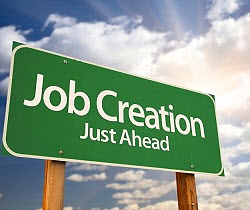 Sometimes the grass truly is greener on the other side of the fence. The financial turmoil of the past few years certainly lends credence to that notion, as the Great Recession’s disproportionate impact on local economies spawned a 24-point unemployment rate difference between the most and least bountiful major U.S. cities.
Sometimes the grass truly is greener on the other side of the fence. The financial turmoil of the past few years certainly lends credence to that notion, as the Great Recession’s disproportionate impact on local economies spawned a 24-point unemployment rate difference between the most and least bountiful major U.S. cities.
More than 100 million people have moved within the past five years, according to data from the U.S. Census Bureau, and 48% of unemployed individuals have picked up their roots in search of a job over that time-frame. This societal mobility stands to be a major asset for job seekers as the economy improves. In fact, 2014 is expected to be a strong year for hiring, with 27% of employers planning to hire, according to the National Association for Business Economics, and a projected 8% bump in the number of recent college graduates who land jobs, per the National Association for Colleges and Employers.
As an advocate for the health of consumers’ wallets, we decided to analyze the relative employment opportunities in the 60 largest U.S. cities in order to give people a sense of where on the map the strongest job markets and greatest prospects for long-term financial security can be found. We did so using 13 unique metrics, ranging from job openings per capita and industry variety to cost of living and the prevalence of employer health benefits.
| Rank | City | Rank | City | Rank | City | ||
| 1 | Fort Worth, TX | 21 | Tulsa, OK | 41 | Chicago, IL | ||
| 2 | Washington, DC | 22 | Omaha, NE | 42 | El Paso, TX | ||
| 3 | Tampa, FL | 23 | San Antonio, TX | 43 | Philadelphia, PA | ||
| 4 | Arlington, TX | 24 | Santa Ana, CA | 44 | Portland, OR | ||
| 5 | Dallas, TX | 25 | Nashville, TN | 45 | Indianapolis, IN | ||
| 6 | Austin, TX | 26 | Columbus, OH | 46 | Sacramento, CA | ||
| 7 | Seattle, WA | 27 | Boston, MA | 47 | Virginia Beach, VA | ||
| 8 | Denver, CO | 28 | Wichita, KS | 48 | Albuquerque, NM | ||
| 9 | Mesa, AZ | 29 | New Orleans, LA | 49 | Anaheim, CA | ||
| 10 | Houston, TX | 30 | Miami, FL | 50 | Cleveland, OH | ||
| 11 | Raleigh, NC | 31 | Atlanta, GA | 51 | St. Louis, MO | ||
| 12 | Corpus Christi, TX | 32 | Louisville, KY | 52 | Oakland, CA | ||
| 13 | Aurora, CO | 33 | Bakersfield, CA | 53 | Long Beach, CA | ||
| 14 | Phoenix, AZ | 34 | Memphis, TN | 54 | Tucson, AZ | ||
| 15 | San Jose, CA | 35 | Jacksonville, FL | 55 | Milwaukee, WI | ||
| 16 | San Francisco, CA | 36 | San Diego, CA | 56 | Riverside, CA | ||
| 17 | Las Vegas, NV | 37 | Baltimore, MD | 57 | Honolulu, HI | ||
| 18 | Charlotte, NC | 38 | Detroit, MI | 58 | Fresno, CA | ||
| 19 | Minneapolis, MN | 39 | Oklahoma City, OK | 59 | New York, NY | ||
| 20 | Kansas City, MO | 40 | Colorado Springs, CO | 60 | Los Angeles, CA |

Commentary on Select Cities:
Fort Worth, TX
The leader of the Long Star State’s impressive pack of bountiful job markets, Fort Worth boasts the nation’s 5th fastest-falling unemployment rate, the 4th largest proportion of full-time employees, and the 2nd most affordable housing. Such dynamics, combined with the lack of either a state or local income tax for which Texas is renowned, are enough to make up for middle-of-the pack rankings when it comes to industry variety, health care coverage and the percentage of the workforce living below the poverty line.
Fort Worth’s largest industry sectors are: 1) Retail Trade; 2) Professional, Scientific & Technical Services; and 3) Health Care.
Washington, DC
The Nation Capital’s high ranking among the Best Cities for Job Seekers is sure to irk those who feel the federal government has become far too large (did someone say Texas!). D.C. ranks 7th nationally in terms of annual labor force growth, 6th for job openings per capita, 4th in terms of both health care coverage and percentage of the workforce below the poverty line, 3rd for percentage of the work force employed full time and 2nd when it comes to median starting salary
However, Washington is about much more than politics and government jobs. The area also has a major presence in the banking, professional services, and tourism and hospitality industries. In fact, Washington actually boasts the 3rd most industry variety in the country, making it a land of promise for job seekers regardless of chosen field.
Tampa, FL
Like other major tourism destinations, Tampa was hit hard during the Great Recession, shedding 140,700 jobs at the downturn’s nadir and seeing real estate prices drop nearly 20%. The area’s economy is nearly back to its pre-recession size, however, and only 11 major U.S. cities have fewer employees per capita living below the poverty line. Tampa’s workforce is also the 8th best paid, when cost of living is taken into account, and also benefits from the 9th most diverse industrial mix.
Arlington, TX
The Texas Rangers, who call Arlington’s Global Life Stadium home, aren’t the only group that’s been hot in recent years. The city’s workforce has been heating up as well, and it now boasts the 2nd most job openings per capita in the country. The country’s 4th most affordable housing market and nonexistent tax burden also help make top-tier starting salaries go as far as possible in Arlington. Such dynamics seem to foretell significant job seeker interest in the area, at least among those who can tolerate average summer temperatures of 96°F.
Dallas, TX
It’s not often that Dallas – where bigger is better with everything from the head-wear to the football stadium – ranks third in the pantheon of anything, let along the hierarchy of cities within its own state. But Dallas’ employment landscape is the envy of all but four major cities in the U.S., and considering the economic roller coaster that the past few years have taken us on, that’s certainly something to be proud of.
Dallas companies pay the country’s 7th highest starting salaries, are the second most reliant on full-time employees, and can use the nation’s 9th most affordable housing market as a major selling point to attract top talent.
Austin, TX
It’s not often the Texas capital plays fourth fiddle in the Lone Star State, but such is the current job market hierarchy, with Fort Worth, Arlington and Dallas all ranking higher in terms of the relative opportunity before the average job seeker. All four cities are in the top 10 nationally, however, and Austin’s sixth overall ranking is driven by the city’s affordable real estate, upper-tier job growth and the absence of a non-federal income tax burden.
Seattle, WA
Seattle has been busy of late, with the Seahawks winning the Super Bowl, cannabis dispensaries opening their doors, and strong job market growth. Perhaps there is a connection. What we can say for sure, however, is that Seattle job market ranks in the top 10 nationally due in large part to the area’s high starting salaries, the fact that a large percentage of the workforce has private health insurance, and a rapidly decreasing unemployment rate.
Denver, CO
While the fact that Denver’s job market ranks one spot behind Seattle’s is sure to ruffle some feathers in the Mile High City considering the Broncos’ recent Super Bowl loss to the Seahawks, having a top 10 employment landscape is a heck of a consolation prize in this unique economic environment. Denver’s job market ranks eighth overall among major U.S. cities due in large part to a fast-falling unemployment rate, high number of job openings per capita, and competitive wages considering the local cost of living. The city is therefore a great place to live and work – just ask Peyton Manning.



